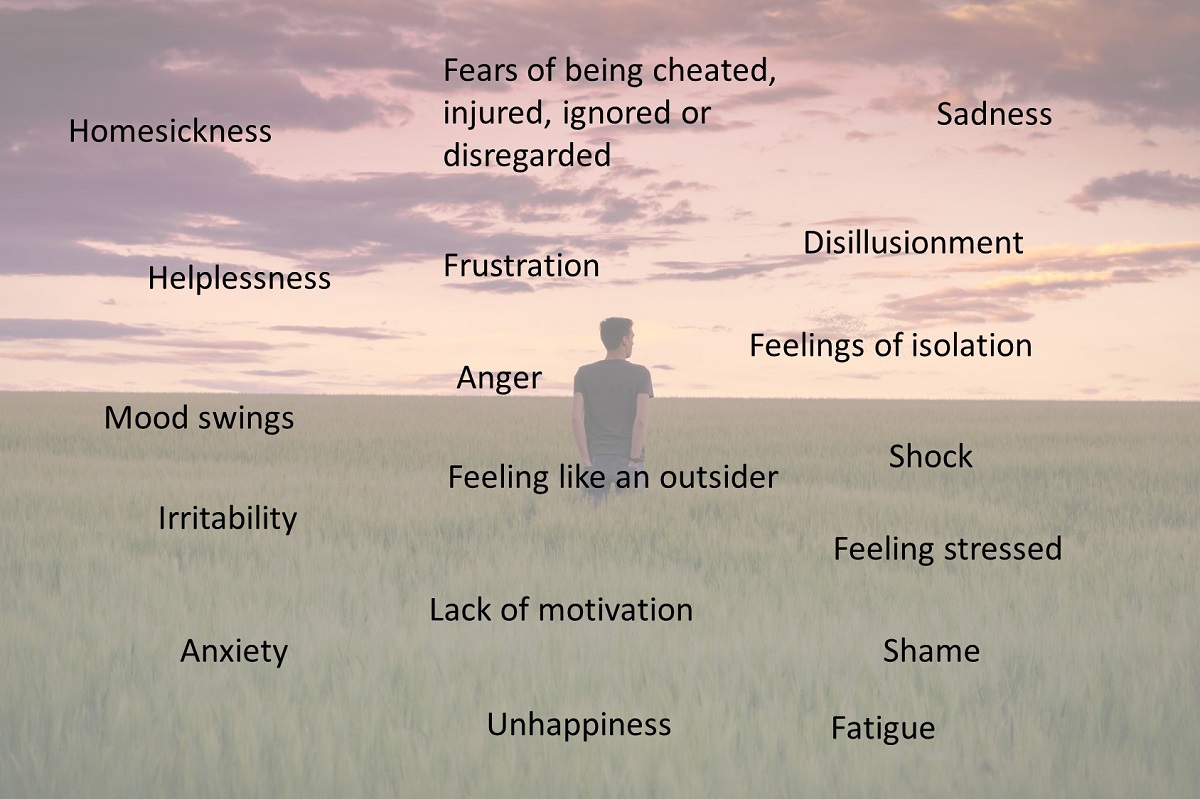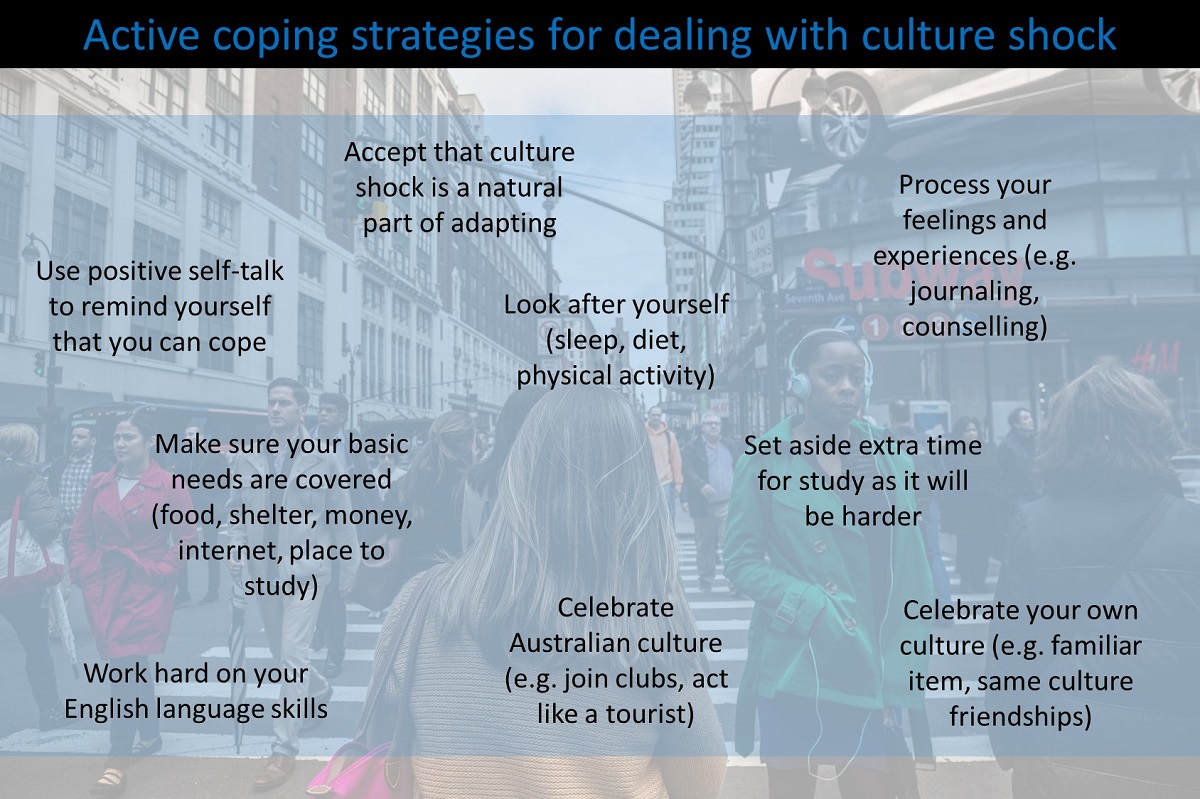
This blog goes out to all the international students, who have left their home countries to come and study here at Flinders.
First off, welcome to Australia and welcome to Flinders! It is great to have you here 🙂
I think universities are better off when they have students from many different countries. It makes the place richer and more vibrant. If you don’t believe me, be around Flinders on Harmony Day (21st March) and see first-hand the representation from different cultures and how it brings life and colour to the campus.
Second, I’d just like to express my admiration for the courage it must take to go and study in a different culture, often in a second language. I found it challenging enough getting a degree in my native language, let alone trying to do it in a second language. You have my utmost respect.
I wanted to talk in this post about ‘culture shock’, something which is very common in international students. Culture shock is a term used to describe the negative feelings experienced by someone when they are subjected to an unfamiliar culture, way of life, or set of attitudes.
In truth, I’m really the last person that should be writing about culture shock. I am not a well-travelled individual. I’ve not travelled to other countries, or immersed myself in other cultures. I’ve never personally experienced culture shock.
What I am pretty good at though is putting myself in the shoes of other people, and trying to imagine what life must be like for them. Trying to imagine what it would be like for someone to pack their stuff up and go and study in a different culture, with a different language and different ways of life. I am also good at reading and absorbing the experiences of others who have written about the topic.
So with that in mind, lets take a closer look at culture shock, how to identify if you have it, why it is important, and what you can do to manage it. If you have experienced culture shock, I would really encourage you to comment on this post and share you thoughts/experiences. Stories of people who have experienced and overcome culture shock can be just what someone who is struggling needs to hear/read. If you’d prefer to remain anonymous, send me your story via email and I will ensure it is catalogued, without any identifying details.
What is culture shock?
Studying and living in a different country means adapting to a whole lot of new challenges:
- separation from loved ones and individuals who you would normally turn to for advice and support
- long distance relationships
- learning a new culture
- feeling like you have to change a lot about yourself to fit in
- losing some of your cultural identity
- often having to learn stuff you might already know or being treated as lower than in your own country
- communication difficulties because of language or cultural barriers
- setting aside enough time to study
- different weather
- different food
- different dress
- different values, norms, etiquette and behaviour expectations
And this is just a small list of some of the challenges!
Stories of people that I have read suggested it wasn’t so much the big challenges that were the hardest, but the many little everyday challenges that added up to be really frustrating – e.g. misunderstandings of culture, trying to deal with support systems that aren’t well explained.
In the process of adapting to these challenges, its normal to experience a range of different negative emotions.

Sometimes these emotions can manifest as physical symptoms or changes in behaviour like:
- social withdrawal
- changes in appetite
- sleep changes
- inability to focus or concentrate
- physical symptoms such as aches, pains, stomach problems and headaches
- being critical of self or others
This collection of negative experiences arising from having to adapt to living and studying in a new country is called culture shock.
It is not experienced by everyone who goes to live and study/work in a new culture, but it is very common.
It can also take quite a few months to develop, so you might be well into your studies before noticing it.
Why is culture shock important?
The description of culture shock provided above sounds pretty unpleasant, which begs the question – why would anyone put themselves through it?
The thing is, culture shock is just one stage of learning to live in a new culture.
Other stages include:
the honeymoon stage– when you’ve only recently arrived in the country and everything is exciting and new and interesting. You feel like you’ve made the best decision in the world.
the adjustment stage – where you are starting to get familiar and comfortable with the new culture and have developed strategies to manage any frustrations or misunderstandings.
the assimilation stage – where you are actually starting to feel at home in the new country, like you belong.
Knowing that culture shock is just a part of the process of adapting to a new culture can help individuals cope. For example, it is easier to cope with negative feelings and experiences if we know that they don’t last forever, and are a normal part of the process.
But in addition to culture shock being a normal part of the process, it is actually an important part of the process.
If you go online and read about other people’s experiences of culture shock, you will soon see that it was the experience of culture shock that often motivated individuals to try harder to adapt.
So whilst they acknowledge it was difficult at the time, they ultimately describe it as a powerful learning experience, something that helped them grow as a person.
It is why people who have studied and worked overseas (outside of their own culture) report being more knowledgeable and interested in other cultures, more confident in themselves, more mature and patient, and more confident with second or additional languages. These are fantastic skills to develop.

Practical ways to cope with culture shock
‘Coping’ refers to the different strategies we use to deal with difficult situations. Passive coping strategies (e.g. avoiding difficult situations) typically end up making people feel worse. Active coping strategies on the other hand typically lead to good outcomes. Here are some active coping strategies for managing culture shock…
+ Start by acknowledging that some of the negative experiences you might be having as an international student are culture shock. Know that there will be tough times, but also know that this is a normal part of adapting to living in a new culture, and that tackling culture shock will help you build skills and attitudes that will benefit you your whole life.
+ Make sure your basic needs are covered like food, shelter, money, internet and places to study. International Student Services are you first point of contact if you are unable to meet these basic needs. In fact, they are your first port of call in terms of understanding what services are available to you as a student.
+ Look after yourself – get plenty of sleep, eat well and stay physically active. Just these simple lifestyle changes can make a lot of difference.
+ Make sure you set aside enough time for your studies. Studying in a different country and language means it will be harder than what you might have experienced at home. You will likely have to set aside more time than the average Australian student. The Student Learning Centre has programs in place to help with your learning.
+ Celebrate both cultures, your own, and the new culture you’re now in.
In terms of your own culture this means: staying in contact with family and friends through email, phone, Skype and Facetime, having familiar items around you, setting aside time to enjoy movies and music from your culture, getting packages from home, joining international student groups, using your family and friends as emotional supports, and building same culture friendships here in Australia, inviting new friends around to experience your culture (e.g. food, movies)
In terms of celebrating Australian culture this means: joining clubs or sports teams, volunteering, reading about Australian culture, watching Australian TV shows and listening to radio, participating in events held around the university, acting like a tourist and visiting tourist destinations, making new culture friends.
Please note: it is totally normal to be confused about Australian culture. You will probably notice many differences in relationships, level of formality, dress, food, behaviour and values. When confused, it is ok to ask questions or ask for help. If you show interest in the culture, people will (mostly) be happy to help.
+ Focus on learning English as best you can using language classes, duolingo, speaking English as much as possible, watching Australian/America/English TV shows, using Google translate, actively participating in tutorials and lectures, and reading Australian websites (I like Lifehacker – mix of culture, tech, productivity and lifestyle)
+ Process your feelings and your experiences by keeping a journal or blog, talking regularly with a trusted friend or family member, or talking with a counsellor. Adapting to cultural differences can create frustration, confusion, tension, and embarrassment. Some students respond by becoming critical and withdrawing – others respond by observing, listening and inquiring (asking questions). Students who take the time to acknowledge and process their feelings are more likely to adapt better.
+ Use positive self-talk. Self-talk is the way we talk about ourselves in our head. Where possible try to be patient (“its ok, I will find a way to deal with this”), have a sense of humour (“it was funny today that I misunderstood the lecturer”), have faith in yourself (“its ok, I can do this, I just need to try again), be open to new experiences (“I will give this a go”) and be willing to learn (“I think I will go and read more about how other international students have coped”). Positive self-talk does not mean telling yourself that everything is amazing, when it clearly is not, but it does involve acknowledging your capacity to deal with the problems.
+ Visit the team at OASIS. They’ve been providing supports and programs for international students for a while now. They have regular open Conversation groups that focus on practising English language, learning more about Australian culture and faith and spirituality.
Final thoughts
The fact that you left your home country, to come study here in Australia tells me that you are a courageous and resilient individual.
If you read this post and found yourself thinking “yeah, I might be experiencing some culture shock” then know that it is not a sign of weakness, or a reason to feel ashamed. It is a normal part of adapting to a really big change in your life.
I hope in this post, I have been able to provide you with a few ideas on how you can proactively tackle these uncomfortable feelings.
I hope also that I’ve made it clear that acknowledging openly that you are having these experiences and asking for help or assistance, is a healthy way of coping with culture shock. Doing so will help you develop skills that will make you even more resilient in the future.
If you’d like to share your story about how you adapted to studying and living in Australia, I would really like to hear it. If you are OK sharing it with others, perhaps write a comment below. If you are happy to share it but would like to remain anonymous, send it to me via email and we can discuss options for posting it, without identifying you or others.
Some other reading materials
When something is common, the good thing is it means that lots of people have written about it.
So in addition to this article, I recommend Googling ‘culture shock’ and spend time reading other people’s thoughts on the matter. You’ll find many stories and articles on the topic, and one or more of them might provide just the bit of advice you need to help you move forwards.
These are just a few of the sites that I found useful as I learned a bit more about culture shock.
http://www.latrobe.edu.au/study/life/living/aust-culture
https://theconversation.com/why-international-students-need-to-make-aussie-friends-30820
http://hijacked.com.au/the-five-biggest-culture-shocks-i-experienced-as-an-international-student
https://www.studyinaustralia.gov.au/
https://medium.com/global-perspectives/the-4-stages-of-culture-shock-a79957726164
The video is old, but it is still relevant – https://ed.ted.com/on/OF1bDdbO

